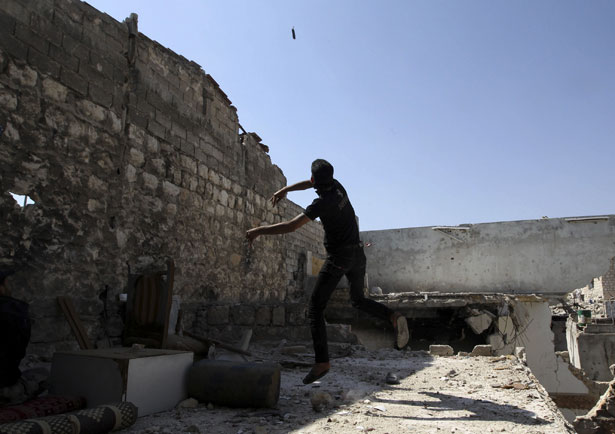
A member of a rebel group called the Martyr Al-Abbas throws a handmade weapon in Aleppo, June 11, 2013. (Reuters/Muzaffar Salman)
The collapse of Mohammed Morsi’s Muslim Brotherhood government in Egypt will make life more difficult for Syria’s rebels. And now, according to Reuters, we learn that the House and Senate intelligence committees are blocking President Obama’s ill-conceived idea to send weapons to those selfsame rebels, many of whom are members of the Syrian branch of the Muslim Brotherhood and, on their right, Al Qaeda.
In a Reuters exclusive, we learn:
Congressional committees are holding up a plan to send U.S. weapons to rebels fighting Syrian President Bashar al-Assad because of fears that such deliveries will not be decisive and the arms might end up in the hands of Islamist militants, five U.S. national security sources said.
Reuters adds that none of the arms promised by Obama have yet arrived. And it reports that both Democrats and Republicans on the committees are not enthusiastic about arming the rebels:
Democrats and Republicans on the committees worry that weapons could reach factions like the Nusra Front, which is one of the most effective rebel groups but has also been labeled by the United States as a front for al Qaeda in Iraq.
Committee members also want to hear more about the administration’s overall Syria policy, and about how it believes its arms plan will affect the situation on the ground, where Assad’s forces have made recent gains.
Reuters notes that neither Secretary of State John Kerry nor the director of the CIA, who both testified in secret before the two committees, convinced them. And the Syrian Muslim Brotherhood is complaining:
Over the weekend, the Syrian branch of the Muslim Brotherhood said it felt “abandoned and disappointed” that the United States and Europe had failed to deliver promised military support to the rebels.
Now that Morsi is gone, the Syrian rebels may have greater difficulty winning support outside Egypt. Along with the Al Qaeda types, such as the Nusra Front, which has support from Qatar, the Syrian Muslim Brotherhood was the backbone of the anti-Assad forces in Syria. In recent weeks, Morsi has cut ties with Damascus and joined a pro-jihad conference in Egypt.
Meanwhile the rebels, ever fractious, are becoming more so. The ersatz prime minister of the main, American-backed rebel organization has quit, further roiling the movement. It appears that Saudi Arabia and Qatar, the two chief backers of the anti-Assad forces, are themselves squabbling.
In Egypt, Saudi Arabia and Qatar ended up on opposite sides there, too. Qatar, which poured $8 billion into Egypt since the fall of the Mubarak government, backed the Muslim Brotherhood, while Saudi Arabia—though it has supported the Muslim Brotherhood in the past, going back to the 1940s at least and especially in the 1970s—has applauded the military takeover in Cairo. So, no wonder that the two oil-rich kleptocracies don’t get along inside the Syrian rebel movement either. According to The New York Times, reporting on the resignation of “prime minister” Ghassan Hitto and his conflict with Ahmad Assi al-Jarba, the new president of the National Coalition for Syrian Revolutionary and Opposition Forces, says:
But [Hitto] faced several challenges: despite the visits, he was seen by some rebels and activists as out of touch with the country, and some members of the often-squabbling coalition complained that he was a favorite of the Syrian Muslim Brotherhood and of its main foreign backer, Qatar. Many in the Syrian opposition say Qatar wields too much influence in the movement.
Mr. Jarba, who is seen as close to Saudi Arabia, a rival of Qatar for influence among the rebels, was seen as a counterweight to Mr. Hitto and his Muslim Brotherhood backers.
The shrinking of political Islam in the Middle East continues, let’s hope. Next target: Prime Minister Ergodan in Turkey.
Robert Scheer calls out the US for its hypocrisy in Egypt.


